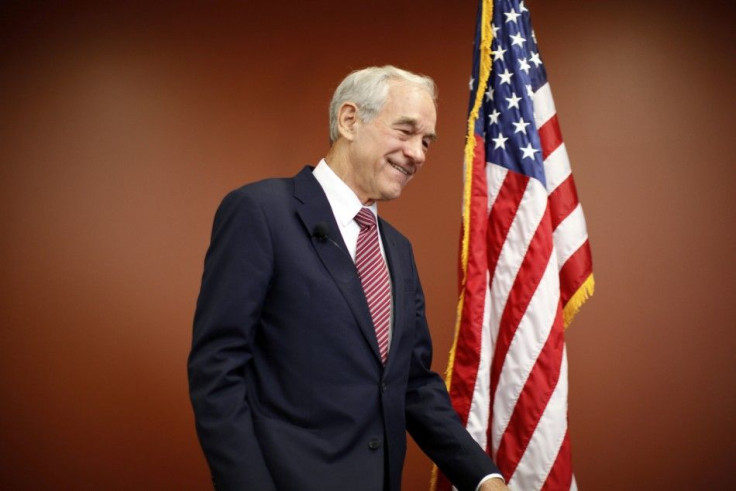Ron Paul 2012: Why He is Right on Foreign Policy
OPINION

Ron Paul's 2012 presidential aspirations are hurt by his foreign policy stance. Or so say the polls.
The truth, however, is that foreign policy is one of Paul's strongest points.
Paul is a non-interventionist. He wants to bring troops home from Iraq, Afghanistan and from all over the world. He wants the U.S. to stop policing the world, mind its own business and spend less money on defense.
This is in sharp contrast to the current state of U.S. foreign policy, which has the U.S. spending nearly five percent of its GDP on the military each year and stationing troops in over 150 countries (including heavy presences in friendly countries like Japan).
The U.S., in fact, accounts for 43 percent of the total global military spending in 2010, according to the Stockholm International Peace Research Institute.
The U.S. was not always this hawkish. George Washington, in his farewell speech, famously warned the U.S. against entangling alliances with foreign countries. He advocated reducing foreign political and military relationships but extending our commercial relations, which is exactly what Paul advocates.
After Washington's presidency, the U.S. strayed farther and farther from his non-interventionist stance as its power grew. By the time the Cold War ended, the U.S. completed its 180-degree transformation into the world police.
This is perhaps understandable.
During WWII, the U.S. was arguably forced into the conflict (moral considerations aside) to prevent the rise of a German empire in Europe and a Japanese empire in Asia.
After WWII, the U.S. was arguably forced to ramp up militarily to counter the rise of the Soviet Union and Communism.
However, one can also argue that the U.S. did not actually need to take this military route.
Washington, in his farewell speech, noted the U.S. had a detached and distant situation.
Geographically speaking, the U.S. is only vulnerable to invasion from Canada and Mexico. A long-distance aerial or naval invasion is impossible unless the invader has a vastly superior air or navy force.
Even if the Allies lost World War II and the Germans and Japanese carved out their respective empires, the U.S. probably would not have been successfully invaded due to the extreme difficulty of distant non-land invasions.
The only serious military threat the U.S. faced in the 20th century was nuclear strikes from the Soviet Union.
To combat this threat, however, the U.S. only needed targeted military spending on anti-nuclear defense.
This threat, however, went away with the dissolution of the Soviet Union, which collapsed under the weight of its own economic sluggishness.
Ironically, military spending was one of the primary causes of the Soviet Union's economic weakness. Some have argued that increased U.S. military spending forced the Soviets to do the same and caused its economic malaise. This theory, however, is not universally accepted.
Speculative theories aside, the reality is that a German empire and a Japanese empire were never created. The Soviet Union is dissolved. The conclusion, therefore, is that the U.S. currently faces no credible threat of a military invasion.
In other words, the justifications for the U.S. to have massive military budgets in the past 70 years - which were questionable in the first place - are no longer valid.
In 2011, only one country -- China -- poses a credible threat to the U.S.
The U.S. is not threatened by China's military might; the Chinese military is woefully behind the U.S. military.
However, the U.S. is threatened by China's vast influence on the international stage.
China's power comes from dangling access to its vast consumer market (i.e. the right to export to it) and its government's staggering $3-trillion cash hoard. So far, it has used these powers to gain access to technology (from the West) and natural resources (from Asia, Latin America and Africa).
The primary fear of the U.S is that once the size of the Chinese economy exceeds that of the U.S. - which the IMF thinks can happen as soon as 2016 - China could marginalize the influence and national interest of the U.S. on the global stage.
A darker fear is the possibility that China will dump its holdings of U.S. Treasuries in the open market and engineer a financial crisis in the U.S.
Ironically, if the Chinese economy and technological advances vastly outpace that of the U.S. in the long-term, the U.S. could eventually face a military threat from China.
These fears are not entirely unfounded. What is unfounded is the phantom threat the U.S. is fighting with its massive military budget. (While terrorism is a credible threat, an enormous spending on conventional military buildup is not the answer).
The same cannot be said about the standing of the U.S. on the international stage. The U.S. economy is stagnating, its industrial base is eroding, its technological edge is slipping and its national debt is swelling. (Washington, interestingly, also urged Americans to cherish public credit in his farewell address).
In response to these challenges, Paul proposes slashing the military budget and bringing back U.S. troops stationed abroad. He also wants to massively cut government spending.
While the merits of big spending cuts are debatable (and beyond the scope of this piece), there is little question that the general idea of reducing U.S. debt and cutting conventional military spending will bolster U.S.'s national security and address potential threats from China.
If nothing else, consider the fact that Paul has raised more money than of any other 2012 presidential candidates from members of the military. In fact, while contributions from members of the military topped Paul's campaign, contributions from individuals associated with Goldman Sachs topped Mitt Romney's campaign.
Military members, after all, know firsthand a thing or two about U.S. foreign policy.
© Copyright IBTimes 2024. All rights reserved.











